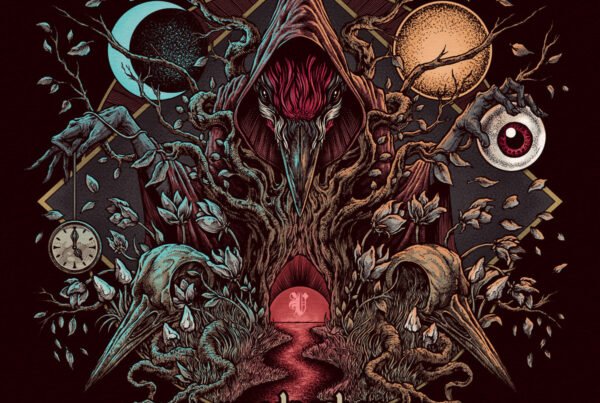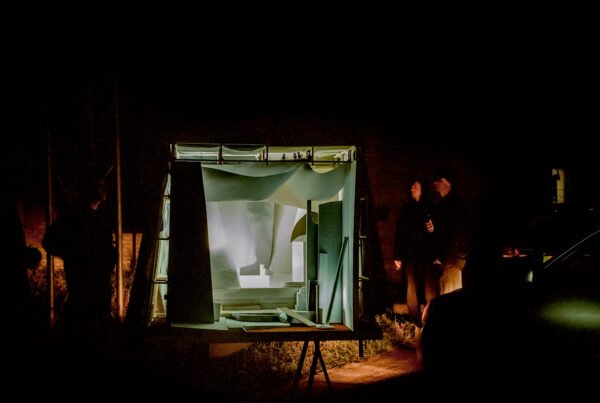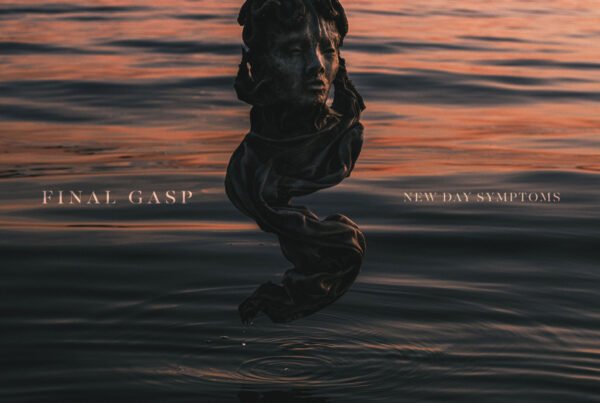John Rossiter’s Young Jesus brings their somber, experimental post-folk to the broken porch swing in your backyard.
Release date: May 24, 2024 | Saddle Creek | Bandcamp | Facebook | Instagram | X
John Rossiter writes songs that are meant to grab you around the neck and get you in a chokehold. The challenge for the listener, in this case, is to identify what purpose said chokehold is supposed to serve. Is it Homer’s clutch of Bart’s throat, the exaggerated comedy of extended tongues and guttural exhalations? The frisky chokehold of intimacy behind the closed doors of a suburban bedroom, a couple trying to shake off the doldrums of 7-11s, strip malls and on-ramps? Or is it the final chokehold, the one that makes you turn from red to blue to death, the final sentence in the self-proclaimed epic great American novel? In the world of Young Jesus, it’s all of these and more.
Their new album The Fool is the sound of those fingers being released from the soft skin of your throat- a liberation from life at its dreariest. That being said, Rossiter’s lyrics understand that to be set free doesn’t mean we ever really escape. And The Fool‘s eleven songs- somber, fierce, and elegantly composed- tell the stories of individuals who understand that rock bottom is just one wrong turn away before you’re right back in the clutches of those fists. You may escape the chokehold, but the bruises will last a while.
2020’s brilliant Welcome to Conceptual Beach and 2022’s pseudo-dancey follow-up Shepherd Head both celebrate successfully escaping the clutches of the stranglehold, but lean closely into sharing those lived experiences. Almost every review of Rossiter’s fifth release with Conceptual Beach was quick to point out the line ‘Every record needs a thesis, needs a crisis or campaign‘ from “Root and Crown”, and deservedly so. Not only is it probably the best opening line from any song released in these not-so-roaring ’20s, it pretty much lays the foundation for building any collection of songs, and The Fool is loaded with crises narrowly escaped.
Like “Root and Crown” the songs on The Fool are largely organic in their sonic exploration of pain. Rossiter uses muted guitars, pianos, percussion and the stark, breathy resonance of his voice to project his stories of regret and shame. “Rich” begins with a gently finger-picked guitar and Rossiter’s thick, husky baritone. ‘I grew up rich, and my daddy did too,’ he sings. ‘But we’re never happy.’ It’s as if Rossiter is sitting across from you in your father’s favorite easy chair, insisting that you listen to what he has to say. And, in almost every case, Rossiter rarely hides his sentiments behind metaphor or nuance. In lesser hands, singing about how your grandfather killed himself and ‘four of us tried, but we didn’t get far,’ could come across as way too on the nose, but Rossiter’s pained voice – and the delicacy of the guitar and glitchy, dissonant electronic noises that buzz in and out – convince you that you wouldn’t dare leave the room until he finished what he said.
Another highlight from the album, “Rich” invokes some of the best of what Young Jesus does. Brilliant harmonies weave in and out over the arpeggiated riff, Bon Iver for those of us who would never dare step foot in a Starbucks. The song is absolutely drenched in shame and sorrow, but ends on an almost celebratory note, including vocals from producer and engineer Alex Lappin‘s great aunt and uncle, and co-producer Shahzad Ismaily‘s daughter, as Rossiter laments his lost youth, ‘back when I was a kid’ repeated ad infinitum until the song gently fades away.
“MOTY” channels Rossiter’s inner-David Berman, starting with a deceptively cheerful hook, guitars, piano, drums and bass before he lays it bare: ‘Your favorite singer doesn’t like the sound of his own voice’. Like Berman’s work with the Silver Jews and Purple Mountains, the song is wrought with self-loathing and irony. His vocals are ripped raw, thrown up front in the mix, and as the tune progresses it gets further and further away from that opening hook. It always threatens to come back, but like life itself, the past is past. The other songs that fill out The Fool play with this dichotomy- of trying to move forward when the past seems like it’s doing nothing but holding you back. “Dancer” sounds largely autobiographical, as Rossiter’s narrator sings of a life of abuse and alcoholism, with moments of light that shimmer through the emotional darkness. ‘When we were young, we were all dancers,’ Rossiter sings. ‘When we were young, we had no fear.’ It’s an album filled with lamentations such as this, an earnest, heartfelt journey to the rawest parts of our being.
For all of its emotional intensity, Young Jesus‘s The Fool exerts its own kind of sonic chokehold on the listener. The songs sound as if they could easily fill an arena with soaring hooks and ascendent crescendos, despite the intimacy. Think The National at their most poppiest: songs chopped and mashed to pieces, fed into the open mouth of a bizarre, cyberpunk Rube Goldberg machine, before being spat out in a series of glitches and blips amongst the acoustic guitars and tortured vocals. In other words, the album is gloriously weird as a whole, but it’s still accessible. After all, it’s those that are closest to us who serve to choke us out in the end. We know them. We love them. And they’re still killing us. Rossiter’s narrative journey of ne’er do wells and ruminating philosophers understand that, and The Fool perfectly encapsulates what it’s like to escape the grip for a moment and continue living, even if it’s for just one more day.






